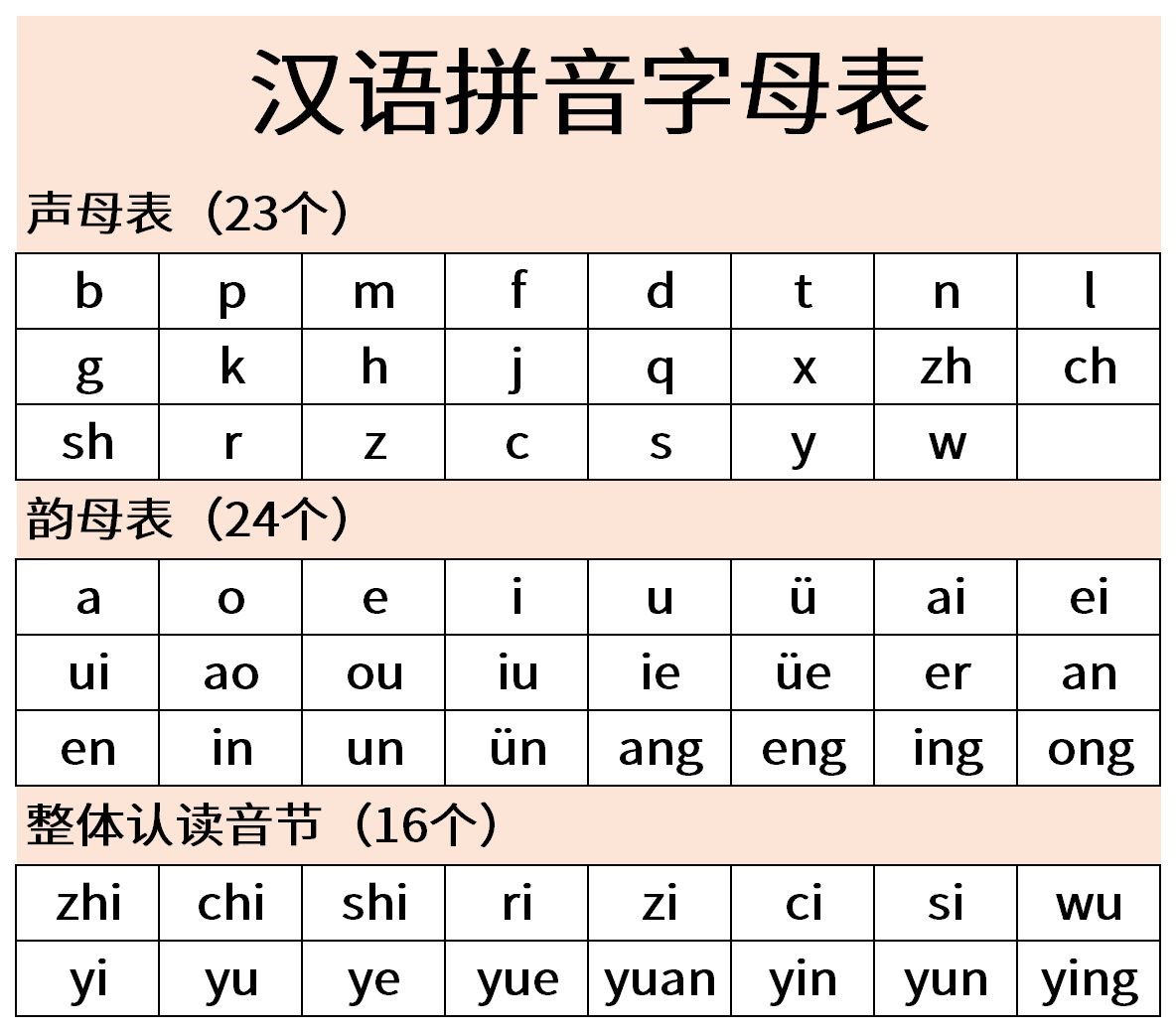Chinese spelling alphabet-initials table (sheng mu)
Chinese Pinyin alphabet, initial consonant (shēng mǔ). It is a complete syllable composed of consonants in front of vowels and vowels. The main feature of consonants is that the air flow in the mouth is blocked by various obstacles. Therefore, it can be said that the process of initial pronunciation is the process of air flow obstruction and overcoming obstruction. Initial consonants are usually low in loudness, cannot be extended arbitrarily, and are not used for rhyme.

Chinese pinyin initials: 23. They are: b, p, m, f, d, t, n, l, g, k, h, J, q, x, zh, ch, sh, r, z, c, s, y, w.
When used as initials, the following consonants are pronounced roughly the same as they are in English.
b p m f d t n l g k h j s
When used as initials, the following consonants are pronounced quite differently from what they are in English.
q x z c zh ch sh r
The initial consonants of Chinese Pinyin are classified according to the pronunciation part: (the part where the pronunciation organ forms an obstruction during pronunciation)
- Double Lipstick: b, p, m;
- Lip and Tooth Sound: f;
- Anterior Sound of Tip of Tongue: z, c, s;
- Midrange of Tongue Tip: d, t, n, l;
- Retrolingual Sound: zh, ch, sh, r;
- Glossal Sound: j, q, x;
- Root of Tongue: ɡ, k, h;
Usage of initials in Chinese Pinyin and Analogy with English pronunciation rules:
b (similar with "b" in "brother" but no buff of breath)
- 菠 bō 萝 luó (pineapple)
- 爸 bà 爸 bà (dad)
p (similar to "p" in "port", "pie" but should be more articulated with more aspiration)
- 跑 pǎo 步 bù (running, run)
- 皮 pí 肤 fū (skin)
m (same as "m" in "man", "mug")
- 妈 mā 妈 mā (mother)
- 买 mǎi (buy)
f (same with "f" in "from", "far")
- 吃 chī 饭 fàn (eating)
- 风 fēng (wind)
d (similar with "d" in "dog", "dust", but no puff of breath)
- 大 dà (big)
- 弟 dì 弟 di (younger brother)
t (similar to “t” in “term”, "tide" , "top". But should be more articulated with more aspiration)
- 太 tài 阳 yáng (sun)
- 特 tè 别 bié( very much)
n (similar as "n" in "no", "nation")
- 男 nán人 rén (male, man)
- 拿 ná (take, pick, hold)
l (same as “l ” in “letter”, "learn")
- 龙 lóng (dragon)
- 快 kuài 乐 lè (happy)
g (similar with "g" in "grill", "good", but no puff of breath)
- 哥 gē 哥 ge (older brother)
- 高 gāo (tall, high)
k (similar to "k" in "key". But should be more articulated with more aspiration)
- 渴 kě (thirsty)
- 可 kě 以 yǐ (can)
h (h sounds like “h” in the English word“her”, "heart" , but it must be added more friction of the breath than it is in English.)
- 喝 hē 水 shuǐ (drink water)
- 河 hé (river)
j (like “j-” in “jeep”, but with the tongue just alittle further forward.)
- 鸡 jī (chicken)
- 家 jiā (home)
q (like “ch-”in “cheap”, but with the tongue just a little further forward.)
- 七 qī (seven)
- 钱 qián (money)
x (like “sh” in “she", but with the tongue just a little further forward.)
- 西 xī (the west)
- 喜 xǐ 欢 huān (like)
z (similar with "ds" in "friends")
- 字 zì (characters)
- 坐 zuò (sit)
c (similar with the "ts" in "bits", “students”)
- 菜 cài (vegetable, dishes)
- 猜 cāi (guess)
s (similar to “s” in “student”)
- 四 sì (four)
- 思 sī 念 niàn (miss someone)
zh (like “j” in “jump”, but with tip of the tongue alittle further back.)
- 这 zhè (this)
- 站 zhàn (stand)
ch (similar to “ch” in “church”,but must have srong puff of breath)
- 吃 chī (eat)
- 长 cháng (long)
sh (like “sh” in “ship", but with tongue furtherback.)
- 老 lǎo 师 shī (teacher)
- 十 shí (ten)
r (like“r”in“rink”, but with the tongue a bithigher so it buzzes ever so slightly.)
- 热 rè (hot)
- 日 rì (sun)